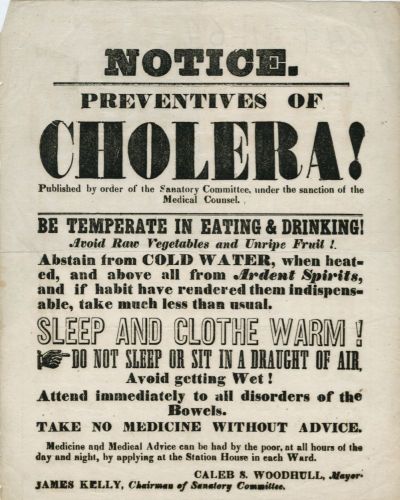By July and August 1832, the height of New York’s first cholera epidemic, those untouched by the disease had little to do but watch, wait, and follow its progress. The City’s Board of Health, comprised of the mayor and aldermen, appointed a three-member commission to address the growing crisis. Although powerless against the raging epidemic, this minuscule force proved remarkably efficient at gathering statistics, and issued daily reports announcing the numbers of new cases and deaths since the previous morning, with the addresses where they occurred. The tallies, posted in public places, were eagerly anticipated. As James Riker, Jr. recalled in a memoir of this time, “We scarcely ventured farther than the apothecary’s opposite to obtain drugs, or examine the daily report of deaths by cholera, new cases [of] which Dr. White kept upon [a] playcard [sic] at his door for the accommodation of the neighbors. We watched this bulletin with a good deal of interest.”
One senses the mounting panic generated by these published statistics in a letter written by the printer William S. Bayley, who charted the approaching disease for worried relatives then safely on Long Island (23 July 1832):
On Sunday (yesterday) the Park [City Hall Park] was black with persons anxiously waiting for the day’s report…. It [cholera] has been at No. 5 Walker Street, yesterday No. 9, and there was a case in our block in Church Street. The report to day shows five cases in Walker Street on the other or farther side of the Bowery. In a word, the disease is so completely spread that we were counting yesterday and could not recollect a street in which it had not been with the single exception of Park Place.
The broadside below is the one Bayley read on Sunday 22 July 1832. Click here to see the portion showing the address 9 Walker Street.

